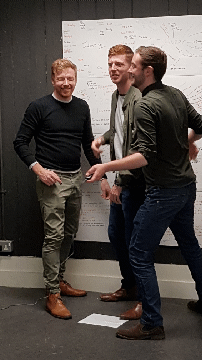
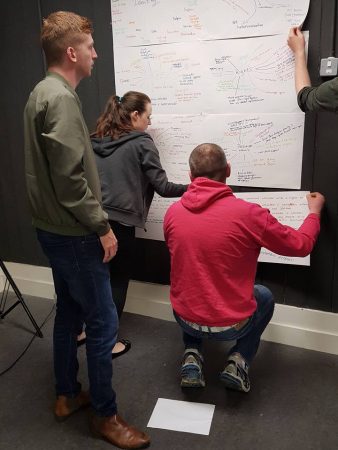
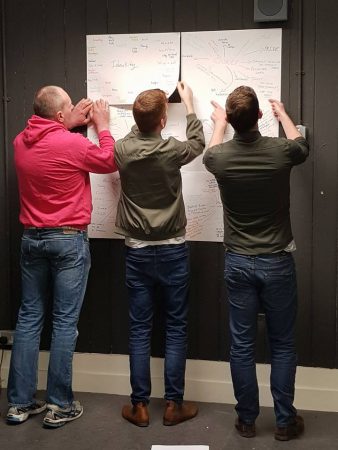
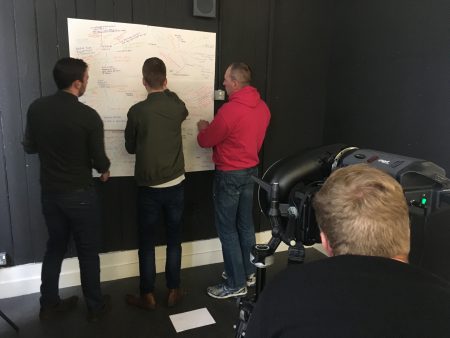
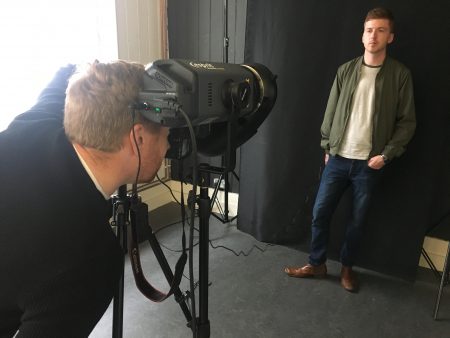
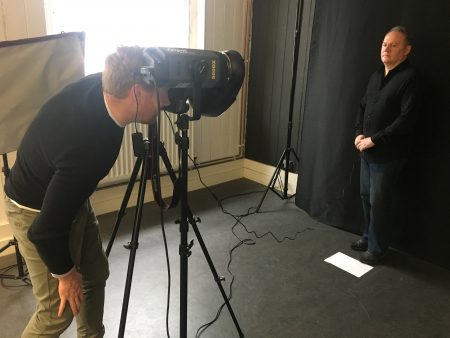
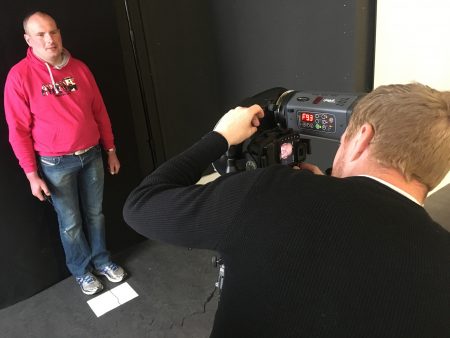
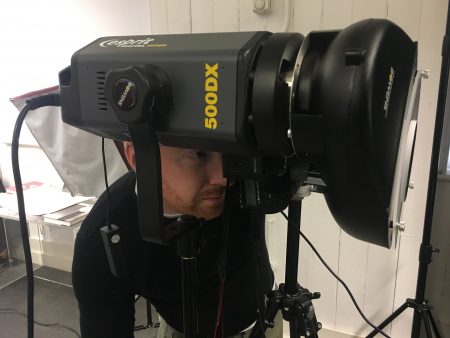
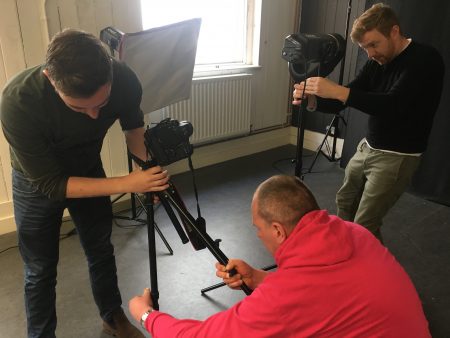









Today was a tricky day as due to a last minute change of circumstances, I had to look after my 8 year old brother whilst participating in the project. Considering this slight distraction, we managed to get quite a lot done over this weekend. We carried on mapping our conversations on LGBTQ+ themes, and this really helped to visualise the issues that we would like to focus on in our final exhibition. We also created more Collaborative Portraits, which my brother found hilarious. I think these pictures help to humanise us as LGBTQ+ people (i.e. putting a face to the community). And I also really enjoyed the process of taking the pictures and playing with the professional camera. We decided to use the conversation maps as the background to these images as a reference to all of the work we have achieved over the past few weekends. Most of the group also have their staged photograph ideas on paper now. To be honest, I still don’t have a solid idea of what I will do for the photographs as most of the ideas that I feel passionate about have already been used by other members of the group. I hope to come across another news story in the next month or so before the time comes to stage the photographs. We also set out a plan for after the workshops which involves a lot of internet-based work and communication between the group members. I am very excited about the online-presence of the project as it makes the project feel like it will have a long-lasting outcome beyond the exhibition in Belfast Exposed.
– Natalie
Themes discussed – rights, offensiveness, reach of the project, target audience
Today we discussed the idea of what the title means and how it could be perceived by the public. Some people thought that due to the recent news and appeal about Asher’s Bakery that some may be put off from the exhibition. This got the group chatting about the over-arching meaning of the title and how even though some may be offended, or believe that we are ‘pushing’ a gay / LGBTQ+ agenda, it’s great that it catches attention and will hopefully provide us with the opportunity to engage and challenge perceptions. We discussed how there is a perception in society that young LGBTQ+ people have an easy time and live in a more accepting society. However, this is not always the case and there has been a recent shift in society towards the ‘right’. It is important that we take a stand and have our voices heard, challenge views openly, debate important human rights issues and inequality, and work towards ending the view that we have to ‘seek permission’ for the things most people take for granted. It was noted that even to this day many LGBTQ+ people still feel ‘lesser’, and how this is something both politics and religion have played a hand in.
Ciaran chatted about his experiences and what he wants for the future, to be a dad. He was surprised that people have asked him / told him that he can’t have children. This is something I want also and made me think if I had to choose either the ability to married or to have children which would I choose… Then I thought how ridiculous is my way of thinking, these are two things that everyone should have access to!
The morning discussion has enthused my passion for doing something which, could at least in some way, add a brick to the pavement for the way forward for LGBTQ+ people. Even if our project just gets people thinking or discussing some of the issues, and more positively the good things / role models LGBTQ+ people are going then it is well worth my whilst. I do as always, and am increasingly conscious of, think that I can’t let myself get caught up in a runaway tangent of anger when I think how annoying it is, in this day and age, that there is still a need for our voices to be heard and to increase our visibility.
– Chris
This morning we have had an important conversation about the name of our project, but it only stemmed from our thoughts about the title and from there opened up into a discussion about our human rights as LGBTQ+ people, the power dynamic that withholds them from us and how to go about dismantling it.
There were disagreements within even our small group about how to approach this.
The argument was made that in order to bring those who are against us around to bring with us we must be careful not to offend or drive them away from our cause, and that we should be, instead, concentrating on ‘luring’ them in.
This approach does not sit well with me personally. I can see where it’s coming from, and admittedly, I perhaps embody this on a day to day basis – for various reasons – e.g., cheating myself, censoring myself, being careful to ensure that I am coming across as approachable and likeable rather than portraying the ‘hysterical woman’ or ‘radical feminist’ approach. I do these things, for the most part, to keep myself safe. However, I feel strongly that this project is bigger that each of us as individuals. I feel a duty and a responsibility not to shy away from inequality when portraying LBGTQ+ people in the North of Ireland, and I feel that worrying about alienating bigots should not be a concern for us – we should not be tiptoeing around them.
Comparisons were made to racial inequality and how it would be unthinkable to even entertain the idea of pandering to neo-Nazis if a similar project was being made in order to highlight inequalities between white people and people of colour. I think it is all too easy for people who face discrimination and prejudice in the North of Ireland to simply accept it rather than challenge it – and the reasons for this are historically complex. We have learnt to normalise unacceptable behaviour towards us, on various levels, including personal and political, and we have become desensitised to it.
– Rachael
Our thoughts about the word ‘queer’: It was interesting to hear how different people viewed and used the word. For me it always had negative connotations and had been used in the past as an insult when I’d showed a sensitive and open side to my personality. Queer was used to imply weakness, softness, girly characteristics in men, and strangeness. It was great to learn from the others how the word has been reclaimed and used for so much good for the LGBTQ+ community.
LGBTQ+ history: We each shared out thoughts on LBGTQ+ history, the good and the bad, people in power who had been vocal about their opinions on homosexuality, and the insults that have been used to describe gay people. ‘Repulsive’, ‘immoral’, ‘sinners’, ‘more likely to abuse children’, were only some of the views which have been expressed publicly and plastered over the media. It was interesting to think about how free speech can be dangerous in the wrong hands, how those who talk so much about their entitlement to free speech and other things, yet strive to withhold entitlements such as that for same sex couples to have a civil marriage. These points seemed to focus around politicians, particularly unionists – which I would classify myself as.
We visited the Ulster Museum to see an exhibit on LGBTQ+ people during The Troubles. It was great to see how some people bumped the trend and didn’t flee to more liberal countries across the water. Even more interesting was how religious divisions seemed less prominent within those communities who stayed. Being gay or lesbian actually brought people together, sexuality topping religion and encouraging acceptance. Perhaps there is a correlation between those who have suffered suppression and societal separatism or conflict along with being attacked for being gay, and those people being more accepting themselves. Therefore, it’s an interesting concept that we’re viewed by some as ‘monsters’, yet are kinder and more accepting of others, celebrate diversity and difference, and do more for society, particularly in terms of pioneering investing in mental health and sexual health.
We discussed how some LGBTQ+ opposers say the LGBTQ+ are too ‘loud’ and ‘in your face’. Which raises the question as to how we, as a minority, have our voices heard on issues we think important. There is an important need for a LGBTQ+ politician that’s actually in a position of power. Why are there no openly gay leaders? Are political parties scared to put forward a leader in case they are too charismatic, too fabulous, change things too much? Maybe they will ‘turn’ everyone gay, or force them to live homosexual ‘lifestyles’?
– Chris
Getting to hear everyone’s views is good, to know we’re all not alone. There are so many of us who believe in the same rights for LGBTQ+ people.
– Ciaran